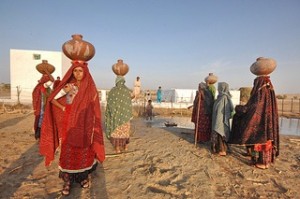Attention Doha: Connect Population and Women to the Global Climate Talks
Dec 5th, 2012 | By admin | Category: Climate ChangeBy Suzanne York, www.howmany.org
Mainstream news coverage of the ongoing climate talks barely exists, and any real progress from Doha would be an unexpected and pleasant surprise, as even its participants would agree (perhaps that was why Qatar, the heart of the fossil fuel industry, was chosen as the venue). This despite some increase in awareness of the dire challenges posed by a changing climate in a year of droughts and superstorms.
The International Energy Agency, which a few weeks ago released its annual World Energy Outlook report, concluded we had better not use 2/3rds of the proven global fossil fuel reserves or else we risk serious climate change consequences. Yet energy companies continue to spend hundreds of millions of dollars exploring for new reserves. As for the current climate talks, the head of the IEA said that he sees “no momentum” on climate, noting that prospects for a legally binding global agreement are currently a “stretch.” Even worse, he believes climate change is “slipping off the policy radar screen.”
What does this mean for the 7 billion people residing on the planet, projected to rise to between 8 and 10 billion by 2050? Will population growth be addressed in the negotiations over man-made global warming and rising carbon emissions? Most likely, governments won’t get past the finger pointing over developed vs. developing economies and the historic and future roles and responsibilities for increased carbon emissions.
Worldwide, population growth is associated with a proportionate increase in greenhouse gas emissions; a 10% increase in population generally yields a 10% increase in emissions. A 2010 study in the Proceedings of the National Academy of Sciences found that slowing population growth could provide 16-29% of the emissions reductions needed by 2050 to avoid dangerous climate change, and reduce emissions by 1.1 billion tons of carbon per year by 2050.
Unfortunately, the issue of gender equality, with it’s close links to population stabilization, is also likely to be missing from these talks. This issue has historically been omitted from past climate negotiations and treaties While climate change affects both genders, it is women who face the most adverse effects due to inequality and discrimination. The also bear the brunt of environmental degradation, as it normally falls upon women to be primary caregivers and must fetch water, firewood, food, etc. Climate disasters put women’s lives in flux and at times in danger, be it from droughts, floods or unpredictable levels of rainfall.
What women need is access to food, clean water, clean air, electricity (specifically clean, renewable energy), as well as education, viable livelihoods, and healthcare. It is this last issue of healthcare that should be prioritized within the global climate discussions. When women are empowered to have a say in their own lives – especially where family planning is concerned – they not only benefit, but the environment does too.
There are 222 million women around the world who want family planning services but lack access and/or accurate information. By recognizing women’s reproductive rights and meeting this unmet need, population growth can stabilize. Then, women’s empowerment will increase, their families will be better off, and in turn, global carbon emissions will decrease.
A sustainable environment and a sustainable population can ease pressure on scarce resources – freshwater, forests, fisheries, food. A win-win for women and the planet.
Thoraya Ahmed Obaid, former executive director of the United Nations Population Fund, a few years ago said the following words that would be good for negotiators to keep in mind:
“The most effective solutions to climate change…will be those that come from the bottom up, that are based on communities’ knowledge of their immediate environment, that empower – not victimize or overburden – those who must adapt to a new world, and that do not create a new dependency relationship between developed and developing countries. The only lasting solution will be one that puts people at its center.”
Suzanne York is a senior writer with the Institute for Population Studies

